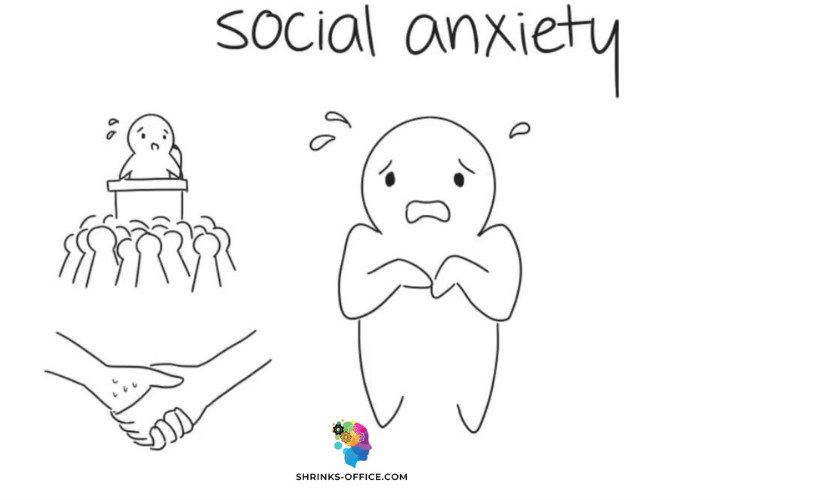In today's fast-paced world, finding moments of mindfulness can be a challenge. Embracing "The Power of Now"...

- Understand your social anxiety
- Set some goals for yourself
- Take baby steps
- Talk to people who make you feel comfortable
- Join a group or club
- Don't be afraid to be yourself
- Be patient
- Seek professional help if needed
Do you struggle to make friends because of your social anxiety? If so, you’re not alone.
A person suffering from a social anxiety disorder [SAD] will likely find it difficult to meet people and make new friends. Social situations can be intimidating, so breaking the ice and starting a conversation becomes difficult when you feel overwhelmed and intimidated.
However, even if you have social anxiety, you can make new friends with the help of a few tips and tricks. With patience and practice, it's easy to find new people who understand your struggles, are willing to listen to you, and are cool with becoming your friends for life.
So, how do you make friends when you have a social anxiety disorder?
Continue reading to find out.
Have you ever felt an overwhelming fear of being judged, embarrassed or humiliated in front of others? This intense worry is what characterizes social anxiety - its more than just typical shyness or introversion. When left unaddressed this fear can significantly impact a persons overall health and happiness. Those with social anxiety may feel compelled to withdraw from all forms of social interaction due to their overwhelming fears about negative evaluation.
Helpful tip: Taking an anxiety test can provide valuable insights into your mental well-being. Seek professional guidance for an accurate assessment and appropriate support.
Social anxiety can manifest through a variety of physical, emotional, and behavioral symptoms. These symptoms may vary in intensity and can be triggered by different social situations. Some common symptoms include:
Anxiety can have a significant impact on various aspects of an individual's life, including:
Social anxiety can be a significant barrier to building meaningful friendships, but it doesn’t have to be permanent. Let's explore how to make friends when you have social anxiety, from identifying triggers to implementing coping strategies:

One of the most critical steps to making friends is to understand the details of your social phobia. According to the National Institute Of Health, SAD is a disorder that brings about intense fear of social interaction, leading to negative thinking, depression, and self-consciousness. It's caused by experiences of being judged or humiliated in public, having difficulty communicating with others, or feeling uncomfortable in new situations. [1]
Nevertheless, you should know that these feelings are a normal part of life, and it doesn’t mean there’s something wrong with you. The more you learn about social interactions, body language, and how it affects you, the better you will face your fears and build lasting connections with others.
Making new connections becomes easy when you set small, attainable goals.
Have you ever done a personal interview? Well, you can start by setting small goals and gradually increase the difficulty as you gain more confidence. It might be as simple as joining a group or book club or talking to someone you find fascinating in public. Remember to choose something that feels comfortable and achievable for you. [2]
To make sure your goals are realistic, consider what triggers your SAD. Ask yourself if certain settings or people make you feel more or less anxious, and start making plans around those situations. Once you have identified what triggers your SAD, set a timeline for achieving each goal. This will help you trust the process and stay motivated.
No, we don't mean you should walk like a baby.
You can start by saying hello to new people you pass by in the hallway or smiling at someone in line at the store. Little interactions like these can be an excellent first step to forming relationships with others. As you become more comfortable, try starting conversations with new people, even if they’re short and simple.
Don’t be afraid to reach out to your family. They can provide a safe space for talk therapy and practice your conversation skills with people.
These can be people you already know, such as old classmates, family members, or co-workers. Even if they don't become close, they can provide a supportive environment to help you practice your social skills and build your confidence. [3]
If you don't know anyone, try conversing with someone at work or school who's willing to spend time with you. Ask open-ended questions and listen attentively to their responses. Try to be yourself and don't be afraid to show your vulnerability. You may even find that some people can relate to your experiences and help you feel more relaxed and accepted. [3]

It can be intimidating to put yourself out there and converse with strangers, but being in a group setting gives you a chance to observe other people's interactions and see how they interact. You may also find it easier to approach someone when you already know the setting and have a common interest. [4]
When looking for a group or club to join, consider what kind of activities and conversations you are interested in. This could include book clubs, sports teams, crafting clubs, volunteer organizations, etc. Many of these groups are also available online, so even if there isn't one near you, you can still connect with others from around the world.
Being yourself is essential when it comes to making friends. When you have SAD, opening up and revealing your true self to new people can be difficult. However, being open about who you are and keeping eye contact is a great way to connect with others. [5]
Try to let go of any fear or worry about what other people might think of you. It's natural to fear rejection, but remember that everyone has insecurities and flaws. You don't have to put on an act to impress others. Refrain from revealing too much too quickly. Start with the basics, like conversing about your interests or hobbies, and gradually work your way up to deeper conversations.
It can take time to build up your confidence and to make meaningful connections with people, so don't expect everything to happen overnight. Take small steps and build on them over time, and don't be too hard on yourself if things don't go as planned.
Also, just have fun, rather than trying to force new friendships. Focus on joining activities that you enjoy or trying out different hobbies, as this will help you to relax and focus on the present moment. In time, you may find that you naturally start to open up to new acquaintances.

If your SAD is getting in the way of making potential friends, seek help from an Online Therapist today. Talking to a qualified mental health professional can help you learn ways to manage your SAD because they'll provide support, guidance, and resources.
Seeking help is not a sign of weakness or an indication that you're “broken.” Rather, it's an important step towards improving your mental health and building meaningful connections with others. Don't hesitate to reach out to a mental health therapist today.
If you want to confirm whether you have anxiety or not, you can take this quick anxiety test.
For people battling social anxiety, creating and upkeeping friendships may pose difficulties. However, implementing appropriate techniques while maintaining a hopeful mindset can help develop meaningful associations that stand the test of time. The following practical suggestions can lend guidance as you embark on this journey:
Helpful tip: A secure attachment style forms a foundation of trust and emotional security in relationships. Nurture open communication and mutual support for lasting connections.
Making friends when you have SAD can be nerve-racking. It’s important to understand the source of your anxiety and how it affects you to take the necessary steps to make friends. Don’t be afraid, take one step at a time. Start with people who make you feel comfortable, join a group or club, and be patient.
Most importantly, don't forget to be yourself! If you need extra support, don't be afraid to seek help. Consider exploring online therapy, where professionals can guide you in building social connections, overcoming social anxiety, and enjoying a fulfilling life. With mutual effort and support, you can build your social circle, form in-person connections, and thrive.
The root cause of SAD is not fully understood, but it is believed to be a combination of genetic, environmental, and psychological factors. Some possible causes of social anxiety include genetics, brain chemistry, environmental factors, learned behavior, and personality traits. [6]
Yes, social anxiety can cause a person to have difficulty making and maintaining friends. People with social anxiety tend to experience intense fear and anxiety in social situations, which can make them avoid social situations. This can lead to feelings of loneliness, isolation, and a lack of social support.
In today's fast-paced world, finding moments of mindfulness can be a challenge. Embracing "The Power of Now"...
In our fast-paced world, finding moments of tranquility can be a challenge. Meditation apps offer a convenient...
In our fast-paced world, taking time for self-reflection and mindfulness is essential for well-being. Journaling can be...
In today’s fast-paced world, managing stress has become an essential aspect of maintaining overall well-being. Two popular...
Dissociation can be a challenging experience, especially the one that happens at work. Are you experiencing dissociation?...
Bionic reading transforms the reading experience for ADHD individuals by guiding the eyes for focus and understanding. Dive into the world of bionic reading.
Explore the complexities of postpartum depression and genetics in our blog 'Is Postpartum Depression Hereditary?' for insights into maternal mental health.
